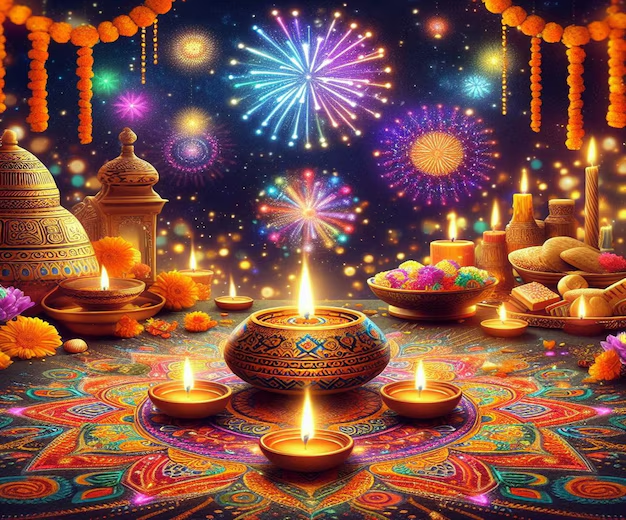Diwali, also called Deepavali, is a festival celebrated in India and other parts of South Asia. This is usually a five-day festival that falls between October and November, based on the Hindu Lunar calendar. It is mostly observed by Hindus, Jains, Sikhs, and some Buddhists. Deepavali has both a religious and cultural significance and the victory of light over darkness and good over evil. Hence, this festival is also known as the Festival of Lights.
The meaning of Diwali varies slightly among communities, but its core theme is rooted in the triumph of good over evil. While Diwali commemorates different mythological events based on its region, the most widely recognized story of Deepavali is associated with God Ram’s return to Ayodhya, his birthplace according to Ramayana, a great Indian epic. It is believed that Lord Ram, his devoted wife Sita, and his brother Lakshaman returned to their kingdom Ayodhya after an exile of fourteen years. The people of Ayodhya lit rows and rows of oil lamps, also known as diyas, to welcome them home and symbolize the removal of darkness.
Deepavali is a time of joy, family gatherings, prayers, and reflection, each of the five days having its significance and customs. The first day of Diwali, Dhanteras, is considered an auspicious day for buying gold and silver. It’s a day that honors Dhanvantari, the god of health, wealth, and prosperity. On the second day, people in South Asia celebrate Naraka Chaturdashi or Choti Diwali. People usually perform cleansing rituals and decorate their homes with lights. Choti Diwali is then followed by Diwali, the main day. On this day people adorn their houses with diyas, electric lights, and candles, and make offerings to Lakshmi, the goddess of wealth. Families often gather together for prayers and seek blessings for prosperity and success. The second last day of Diwali marks the first day of the new year when friends and relatives visit each other with gifts sweets and best wishes for the season ahead. On the final day, Bhai Dooj celebrates the bond between brothers and sisters. Sisters perform rituals for their brothers’ well-being, and brothers give gifts in return, symbolizing mutual care and protection.
Beyond the celebrations and traditions, Diwali is also rich with symbolism and meaningful customs that brighten up the festival. Diyas are lit in homes and along pathways to invite the blessings of Lakshmi and to drive away evil spirits. Apart from the diyas, firecrackers illuminate the night sky and symbolize the defeat of darkness and ignorance. Moreover, families prepare a variety of traditional sweets and dishes to share with relatives and friends. Last but not least, colorful rangoli (intricate patterns made from colored powders or flowers) designs are found at the entrances of homes to welcome prosperity and ward off negative energy.
All in all, Diwali is a time of unity, celebration, and spiritual reflection, embracing the values of kindness, generosity, and joy. It’s a festival that brings families together and allows people to reconnect with both their traditions and loved ones, making it truly special for millions worldwide.

